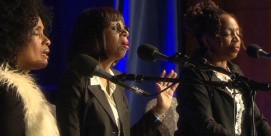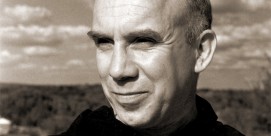In This Episode << SLIDE LEFT TO SEE ADDITIONAL SEGMENTS
Reverend Gardner C. Taylor Extended Interview
Q: When did you know you had a call to be a preacher? How did you know?
A: I suppose somewhat subconsciously I always [knew]. My father was a preacher, and in my earlier years I did not want to be a preacher at all, though I admired him greatly. But he was gone by the time I was thirteen. I wanted to be a lawyer, but no person of color had been admitted to the Louisiana bar ever, and when I told an old family friend, a gentleman, a man — I was a youngster — I wanted to be a lawyer, he said, “Where you gonna practice, the middle of the Mississippi River?” So I got into this, so I’ve been at it.
Q: How did you know, though? How did you know this was the right thing that God wanted you to do?
A: I did not know it. I would guess that it has been only within the last, relatively few years ago that I began feeling more comfortable at doing it. I didn’t know. I had a strong sense that this was what I ought to do, and what I needed to do, and what I had to do, but being sure about it, I didn’t.…It is a strange kind of work, and I’m not sure normal people ought to go into it.
Q: Why is it strange? Why do you say that?
A: Well, a very elementary thing, but one goes to a lot of meetings, evening meetings, and this is very elementary. Most people come home from work, look at television a little while, go to bed. The preacher is likely to come home, nine or ten o’clock at night; no matter how uneventful or pleasant the meeting has been, there’s some tension involved in being with people, and he or she then gets ready for bed twelve or one o’clock. That’s very elementary, but that’s a part of how odd it is. I’m not downplaying it; I’m thankful that I’ve been a preacher, but I realize that there are some odd aspects to it. The young women at Oberlin years ago used to say those of us in the graduate school of theology were Heinz 57 varieties, and they’ve been right, too.
Q: Do you think preaching is a gift or a skill?
A: I think it’s a combination. I think any gift has to be honed, and of course if one cannot speak clearly, well, it’s pretty difficult to be a preacher. I have known some preachers who were very clumsy in just articulation, and I’ve often wondered how they manage, though I had a youngster in a class at Harvard who stuttered, but it was a kind of fetching — a pleasant, an engaging kind of thing. But I think that’s very hard.
Q: What helped to develop your own preaching style? What were some of the biggest influences on you?
A: The first impression was my father, but my father was not highly trained at all. I don’t think he finished high school, but he read widely, and when I was a lad he was talking about the Battle of Thermopylae and all of that kind of thing, and that kind of got in my blood. I’ve never quite understood it; he had a feel for the language, as did my mother, though on his side both of my grandparents were slaves, and neither could read or write. But somehow he had this feeling for the melody of the English language, and I inherited it.
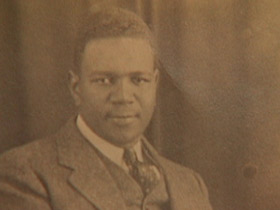
Q: When you think about a church service, how important is the preaching part of it? There is worship and singing, but just how key is preaching?
A: I think sometimes those of us who preach overemphasize the preaching part, but I think it is crucial to the tradition, the history of worship, and therefore to the feeling of people of what is appropriate. I think it has a real purpose. It is a terribly weak form of communication, because the spoken word can be so easily misunderstood, and sometimes a preacher is not as clear as one ought to be about what one is trying to say, and it is quickly lost. It’s uttered, heard, and sometimes lost, but it is the mystery of preaching that it survives — and that it has survived so much of our bad preaching, I think, may be the most remarkable trait about it.
Q: How do you assess the general state of preaching today?
A: I think it has become far more folksy, and there is now a tendency, I think, more than ever, to make it a kind of Sunday Chamber of Commerce exercise — motivational speaking, which has its place but is not the Gospel. It becomes a kind of opium, if opium is a stimulant, for people, which gives them often a false notion of what life is all about. I think much of contemporary preaching does not prepare people for the inevitable crises of life. When we talk constantly about prosperity, well, life is not constantly prosperity. It has adversity and difficulties, and if one is trained, conditioned to see only the bright side of things, then one is not prepared for living in this world.
Q: Do congregations want to hear that message, though?
A: Of course, people want to hear it, because candy is a very pleasant thing. My daughter lives out in Harbor City, [California]. When she was a little girl, I suppose we could have fed her candy morning, noon, and night, and she would have taken it morning, noon — and enjoyed it. Soon she would have had no teeth, and soon we would have had no daughter, I think, because candy is wonderful. I love it, but one needs in one’s diet more than candy.
Q: Who are some of the best preachers today that you like to listen to?
A: I am not privileged to hear preachers because — and this is not a cop-out, it’s honestly I don’t hear preachers, because almost always when I go somewhere I am a preacher. But there are fine preachers in the country. Otis Moss is an excellent preacher, and Maurice Boyd in New York, who was at City Church, James Forbes at Riverside — marvelous preachers around the country.
Q: What do you think of megachurches and some of these big churches with leaders who preach on television?
A: It is a phenomenon, and it is one very much in vogue. How long it will last that way, I do not know. The question about it — and it has positive qualities, no question about it — but the question about it is what is the sense of community, of fellowship? And whether it is a full-orbed Gospel or something very partial and very elemental. The Gospel, like anything else, can easily be distorted. I won’t say prostituted — though I might. It can easily be distorted so that one aspect of it is expressed, leaving out the full measure of it. Of course, that’s true, [that’s] the problem for all of us, of not just preaching the things that we take to. Every preacher has the danger of falling into that trap of dealing with something that’s favored, that one likes. That’s one of the disciplines of preaching — engaging people in things with which the preacher himself or herself is not exactly comfortable.
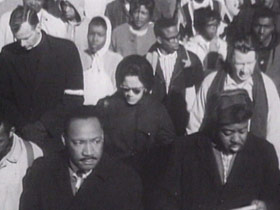
Q: You were very involved in the civil rights movement, when churches were engaged in social justice. The further we move from that time, the harder it is for people to remember how key the church was to the movement.
A: Many churches were [involved], and many churches were not, of all kinds. Some were committed, and some were not. It was an exciting time and a tremendously significant time. I have said more than once now that many people, blacks and whites, have under-assessed the meaning of the civil rights movement. The civil rights movement, of course, opened opportunities for participation in democracy to people of color. But it also lifted from the nation a kind of pall of shame. Can one imagine the president of the United States in 2006 appearing in the family of nations with the glare of television lights upon him or her, coming out of an America of 1950 talking about democracy? One would not be merely laughed out of court, one would be almost tarred and feathered, certainly intellectually, by the family of nations. It would be ridiculous. The civil rights movement not only gave blacks a certain amount of participation in democracy, but it enabled America to feel less ashamed about our failure, significantly less ashamed.
Q: It was the religious roots of that, though. There was…
A: Yes. Yes. Yes.
Q: …a real faith component. How important was that?
A: Well, of course, Dr. Martin King was the focus of it — also a child of it. And churches were the only thing, the only institution — well, schools — but churches were the only institutions that might have served as a forum for the civil rights movement, and many churches did, though to be honest about it, there were churches who did not participate in it.
Q: Some felt it wasn’t appropriate for the church to get involved in that kind of activism?
A: Some, yes. You know, there has been a notion almost all through history that the church is — and this is a strange kind of thing — is an other-worldly institution. It ought not be involved in the bread-and-butter matters. That is not a New Testament idea at all, but it is, I think, an easy way out and therefore attractive. There is something about the Christian faith that, I almost hate to say, invites heresies, distortions. Maybe that’s true about everything, but certainly about the Christian faith. The Christian undertaking has, all through history, had those barnacles, those detractions that have sometimes been very popular. I think much of this health-and-wealth, prosperity — I think that’s a heresy. It’s not New Testament Christianity at all.
Q: People say you were a big influence on Martin Luther King Jr. and his preaching. How do you think you influenced him?
A: Richard Lischer particularly, over at Duke, has written that, and others have said it. I’m not the person to make that judgment. We were friends; we vacationed in this country and in Jamaica, and in Puerto Rico, and once in Rio, where going into — it wasn’t a supper club, I guess — a restaurant where there was entertainment we met the grandson of Booker Washington, a startling kind of thing. We were friends, I would go that far.
Q: How did he influence you?
A: I have been more influenced in looking back upon Dr. King’s years than I was during his time in this sense: While we vacationed — and he was a marvelously pleasant person, but always seemed to be somewhat preoccupied. I did not realize — I should have, I’ve felt guilty about that — I did not realize the pressures this man was under. He was, of course, opposed by much of the South, and some of the whole country, but much of the South. He had a very tenuous relationship with both President Kennedy and with President Johnson. He was not universally supported by blacks. There were threats on his life constantly. He lived under that shadow day by day, and as I look back upon his years, I wonder how he managed. I spoke at the first anniversary of the Montgomery Improvement Association, and I remember staying at Ralph Abernathy’s home, and there were lights all around it. One did not sleep easily. There was just tension in the air, and he lived it. It was relatively easy for me. I came in from New York, I spoke and left, but to live in that day after day after day. I don’t think I realized it while it was going on, as I should have.
Q: And he didn’t necessarily give any indications that…
A: No, he didn’t. Seldom talked about it, and when he did it was with a bit of wry humor. No, he didn’t talk about it. I guess he couldn’t.
Q: Together, you both were pushing the church establishment at the time to get more involved in the movement.
A: Yes, we were.
Q: Today what do you think? Is the prophetic voice of the church where it should be?
A: I don’t think so. Of course, some of what I say are the musings of old age, I’m sure, and one tends to be critical about the past. But I don’t think so. I think the church today in America partakes of the contemporary American disease of, “Let me alone, I want to get along, and I don’t want to be bothered with too many things,” and I think that’s in the churches.
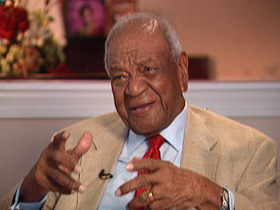
Q: What role would you like to see churches play?
A: Oh, my goodness, I think the church has a profound moral obligation.…It’s a matter of involvement. Also, preachers, black and white, who commit themselves more than nominally to the society’s situation are likely to find indifference, maybe hostility on the part of their congregations, because, here again, all of us tend to want to not rock the boat. I think that’s a human tendency — more than a tendency.
Q: What responsibility does the preacher have to rock the boat?
A: I think the preacher has that responsibility. Of course, I don’t think the preacher has any excuse for speaking to people as from some heightened distance, speaking down to people about what we ought to do, because the preacher is a part of the problem, too, as are the people.
Q: What are some of the social justice issues or other issues today that you would like…
A: Poverty is a great issue. The press is repeatedly saying that the gap between the haves and the have-mores and the have-nothings continues to widen. And, sadly enough, one must say that in the last few years that gap, so I read in the papers, has widened. And if the church does not, if the preacher does not, the priest does not, the rabbi does not, the church does not, who will? And when? When a pulpit becomes an echo of the pew, it loses, I think, almost all of its reasons for existence.
Q: What about other issues? What about internationally?
A: Our nation is in a critical situation, more at hazard and risk, I think, than we recognize, and I don’t have an answer to that. I’m not sure anyone does, but there is a certain peril in power, and yet a nation cannot help reaching it’s height of strength, of power. But history does not have a record of a nation which has reached the pre-eminence in power which has not suffered from that pre-eminence. I think if history is clear on anything, it’s clear on that. Lord Acton, who was a Roman Catholic, incidentally, wrote the Anglican bishop of London that very well-known quotation that power corrupts, and absolute power absolutely corrupts. But this is the human situation. A nation cannot help reaching for that power, but what to do with it once a nation has it is the problem. Of course, also, that preeminence of power attracts, almost mandates a certain resentment on the part of other nations, and I think that’s part of what we suffer from.
Q: And what is the role of the church in speaking to that?
A: I think that the church has first to declare that it is not a creature of any nation and that it has a word to speak, hopefully, with all of the alloys and imperfections, but it has a word to speak. As far as it can, it ought to try to be God’s voice in society. Now, one has to hesitate about that, because I am suspicious of people who know exactly what God is doing. There is an old hymn, “God moves in a mysterious way,” and I believe he does. I had a class at Shaw [University] in which a young woman said the problem in New Orleans was that it was a sinful city. Judgment of God came upon it. I pointed out to her, “But the French Quarter, which is the capital of what we call corruption, gambling, liquor, was not flooded at all.” It survived; it has never closed down. I tell you, one has to be humble talking about what God does. Given that human imperfection, that incapacity to understand really what God is doing, one has to seek to do so, and there are indications that are clear. Certainly, God is more interested in, is committed to justice and not injustice. This is one of the problems of preaching. One has to be humble and yet explicit. I started to say humble and arrogant. I shouldn’t say that, but I’ll almost say that. One has to be humble and one has to be arrogant at the same time. This is one of the difficulties about the undertaking. Arrogant enough to assert it, humble enough to realize that no human has a right to claim that kind of authority.
Q: When is it appropriate to get involved with power, to get political even when it does damage to religion?
A: Of course, that can happen. I had that problem. I was co-leader of my party in King’s County in New York for a number of years, and I felt compromised because there are party loyalties, there’s no question about it, and I always felt, when I was co-leader of King’s County, that anything I said had a little taint about it, because I felt people would say, “Well, what else do you expect, he’s a….” And yet, to divorce oneself from what is happening in society is foolish, I think, because no matter how we try to remain distant, we are involved. There are birth certificates that the government issues, wedding certificates that the government issues, death certificates that the government issues. Henry Thoreau prided himself, so I’ve read, on being free from all of that. But Ralph Waldo Emerson was bringing him food, which came out of the society. He was free from involvement, but he was getting the benefits of the involvement, and I think we’re all like that.
Q: Some churches, particularly black churches, have been criticized for having political candidates come and speak from the pulpit, or for having preachers politicking from the pulpit. What is your advice?
A: Of course, this is not true of all black churches. Some have been very aloof, and some have been completely politicized. I remember a gubernatorial candidate in New York coming to my own congregation, and I said to the mayor of the city, who was my political friend and I think a little more than that, that he and I would meet this candidate at the door of the congregation when our service was over. And, of course, that too was a kind of endorsement. I don’t think, except in cases clear-cut, where a candidate is opposed by a candidate who is obviously not just anti-black but really not committed to the best purposes of democracy — I think, take that out and I don’t think churches have a right to favor a candidate merely because he is, she is, of one party or another. But where there is a moral issue, and where a candidate’s position and platform obviously is against the common welfare and against black interests, for that matter, I think I am pretty sure the church has a right, and maybe beyond that a responsibility, to expose that difference, always remembering that all of our human judgments are clouded, almost all of them, and are not completely clear-cut, and that ought to give to us a certain humility about whatever we do. It’s not 100 percent.
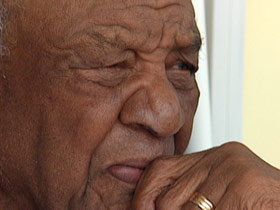
Q: Speaking of humility, let me ask you what you think of the titles people have given to you over the years — “one of the greatest living preachers ever” and all of that.
A: My answer to that is they’ve not heard all the preachers, number one. Number two, they’ve spoken of me as the dean of black preachers. I think I heard, preaching up in the New England schools, that a dean is someone — I don’t think this is true of all deans — but that a dean is someone who is too smart to be president but not smart enough to teach. I think we have to be very careful about taking things too seriously. There’s a wonderful story that’s attributed to either Charles Spurgeon, the London preacher, or Frederick Robertson, who preached at Brighton. When the service was over, someone said to him, “Oh, that was a marvelous sermon,” to which he said, “The devil has already told me that.” I think you have to be careful about it. Of course, it’s flattering, and one feels pleased about it, but one ought not take it too seriously. Also, I think that a preacher is about as good as the last sermon one preached.
Q: What do you hope your contributions to the church have been?
A: The thing I feel most complimented about out here in the gloaming, where I am, is when young men and women come to me and say that what I’ve tried to do has meant something to what they’re trying to do. There’s a very well-known preacher in Chicago, Jeremiah Wright at Trinity Church, who wrote me a lovely letter the other week and said that I knew his father and mother, and when he was a youngster he heard me preach, and he found grounds for his own work. That compliments me more than anything.
Q: How has your own preaching changed with age?
A: I have become more sensitive to the human situation, to how fragile we are, from family relationships — and naturally in our mere existence. When one is young, one sees our mortality at a distance. As we get older, we ought not become morbid, but we realize more and more that ultimately we are very fragile creatures. I think that has crept into my preaching more in later years.
Q: What are some of the spiritual themes you have been meditating about or thinking about lately?
A: Well, some of them we have been talking about. I have thought about them early on and later: How does a church relate to society? How does the preacher give a full-orbed, a balanced, a complete Gospel? Because when one emphasizes one thing, by that very emphasis one is deemphasizing and neglecting and distorting the Gospel by not realizing that there is another side to it, and yet one can’t forever be balancing this and that. So I have pondered that these days, and I have pondered very much where the nation is going, and I am troubled by the black community. I am not sure that — well, let me put it this way. Once, many people of color thought that all that you needed was complexion. If you got a person of a certain complexion in a position of influence, you had it made. Well, I no longer feel that’s true. I am sure now that color is not enough to be confident about integrity, and about commitment, and about the cause of democratizing the nation. I don’t think so.
Q: What is missing?
A: What is missing is [that] people of color, like all other people, and I’m included, tend to be interested in self. It is easy to lose the interest in a larger purpose, if one feels that one is advancing one’s self, and I think this is a problem. It is not only a problem of black people; it is a problem of communities. It is a problem of being human. Almost all of us are concerned about our own welfare. When our own welfare collides with the public welfare, one is likely to choose one’s personal welfare over the public welfare, and I think we have to be on guard about that.
Q: How do you, as a preacher, keep up your own spiritual strength when you always have to be out there having the answers?
A: I had an experience last week. I belong to a church. David Forbes is the pastor of it. We were talking, and I said, “I’m coming to church Sunday. I’m free.” He said, “Why don’t you preach?” I said, “No, my tank is empty. I’m pulling into a service station. I need to,” and I did. Alexander McLaren, who was an English preacher at Manchester in another century, gave something to me through his writing. He spoke about sitting silent before God, and I wish to heaven I had practiced this more early on in my ministry. This is not praying, it is not reading, it is just opening oneself. It’s a mystic kind of thing. But we do so little of it, and we who preach are likely to engage ourselves in so many things and to neglect that aspect of being open to what God has to say. I think many of us who preach also feel that we must justify ourselves in the community, and there is a certain suspicion that preaching is something that doesn’t belong to the ordinary pursuit of life. We tend to be forever busy in order to justify our existence, when a part of our justification is that we are free to be reflective and to carry on that communion with God without which life is really not easily accommodated, and certainly without which preaching is hopelessly weakened. So, I have done more of that. Now, here again, that can be an excuse for laziness, too, you know. You’ve got to watch these things, yes.
Q: Has your relationship with God changed as you have retired and gotten older?
A: I’m 88, and I lean much more upon the promises, because I need them. I guess I always needed them, I shouldn’t say that, but I feel the need of them more, because I recognize that at 88, my years are — this is not morbid — my years are years, are very much limited.
Q: What are the promises you are leaning on?
A: That He will see about me, and I do not know what, but that I will be in a better condition than I am now, and I think that’s at the heart of the Christian Gospel. I wonder. I have known people, people in my family who had no specific Christian commitment. One was very close to me, my aunt, and [she was] like a mother. I wonder how people face all of the exigencies and crises of life, but particularly old age and death, without a faith. I guess people do it, but I’d rather I don’t have to do that.


